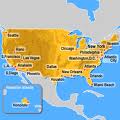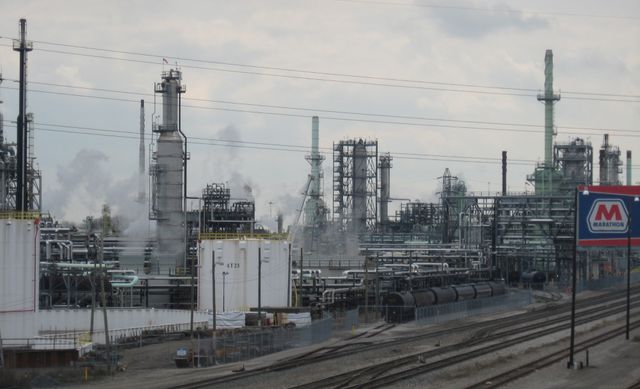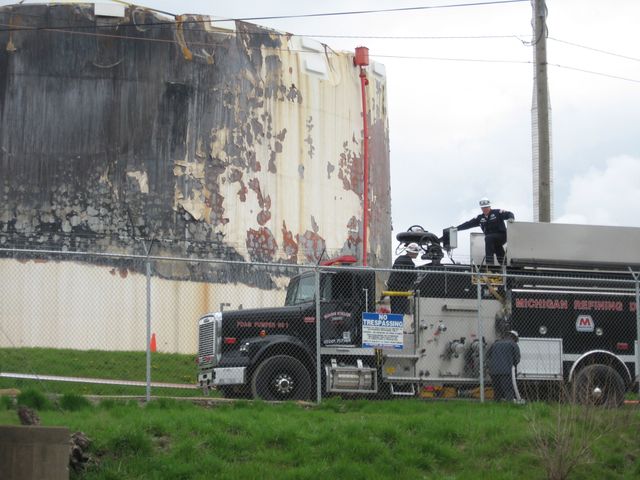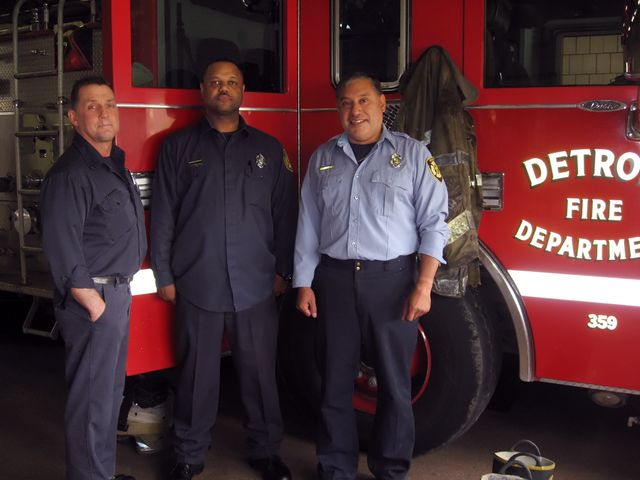Explosion at Detroit oil refinery raises danger of wider disaster

By Bryan Dyne
A tank of sour water, a mixture of hydrogen sulfide and ammonia generated from refining crude oil, exploded at the Marathon Detroit Refinery in southwest Detroit during maintenance work Saturday evening. No injuries have been reported. It is unclear whether the maintenance check or some other factor sparked the explosion.
In the immediate aftermath of the explosion, a mandatory evacuation order was issued for 3,000 residents of Melvindale, a suburb of Detroit, due to concerns of deteriorating air quality caused by the resulting fire. Residents were told to go to the city’s ice arena-civic center.
The evacuation order was canceled after an hour when Melvindale Police Sergeant Michael Welch announced the pollutants detected by Melvindale’s air monitoring equipment were within acceptable levels. However, residents reported that strong lingering odors from the fire lasted until 9 p.m. Detroit did not issue a similar evacuation order for its nearby residents.
Although officers evacuating residents wore respirators to shield against possible toxins, similar protection was not given to residents. It is not clear the scale of toxic chemicals, including carcinogens, released into the environment as a result of the fire.
The fire that erupted after the explosion just before 6 p.m. on Saturday was extinguished within two hours by a combined crew of Marathon, Detroit and Melvindale firefighters. Despite the relatively small scale of the fire, similar to the scale of a previous fire at the refinery in 2011, it raised the specter a much larger industrial catastrophe.
“In the worst case scenario,” a Detroit firefighter at the station that responded told the WSWS, “if the entire plant went up, it could mean that everything within 10 miles would be gone too. This was a near miss.”
The firefighter explained that the trained fire safety specialists at Marathon had retired and the company had only replaced them with first responders. The ability of Detroit firefighters to respond to potential disasters, he explained, had been deeply undermined by years of budget cuts, reductions in manpower and the permanent or rotating closure of stations. In addition, there is a dangerous shortage of equipment, including aerial ladders, because of the wear and tear and cuts in maintenance. The very day the WSWS spoke with the firefighters, Emergency Manager Kevyn Orr was meeting with the union to outline the wage and benefit cuts he plans to impose on them.
“We don’t have the equipment we need to fight the fire as a result of the budget cuts. We don’t have foam to put out chemical fires so we had to use Marathon equipment to put out the fire. Without that equipment, we’d piece together what we could, but the dangers are that much higher.
“There haven’t been new firefighters hired since 2004 and a lot of guys that are near retirement are going to be pushed out. That experience is going to be lost. People are being demoted to cut costs and the equipment isn’t maintained. All these cuts, which don’t include whatever is coming from the emergency manager, mean that incidents like this can cause major problems. If there were another fire in Southwest Detroit while the fire at Marathon was happening, it would have swept through the area before other rigs from the city could come to fight it. The city is rolling dice with people’s lives.”
The Marathon Detroit Refinery, which is 83 years old and has 300 employees and an additional 300-400 contractors, is the largest crude oil refinery in the Midwest and the fourth-largest refiner in the country. In 2012, it completed a four-year $2.2 billion expansion to increase its production of refined oil from 106,000 to 120,000 barrels a day, mostly to process crude oil imported from Canada.
This will only exacerbate the poor environmental conditions in the area caused by the plant. Despite the fact it received an award from the Michigan Occupational Safety and Health Administration for “health excellence,” a study by University of Michigan environmental scientists showed that the Zip code where the Marathon refinery resides is the most polluted in Detroit. The city itself is the most polluted area in the state of Michigan and one of the most polluted cities nationwide.
The residents commonly have a variety of afflictions: asthma, leukemia, sarcoidosis and multiple types of cancers. In interviews with residents, the study found it is not uncommon for people to die of cancer in their mid-sixties. This was attributed to the high rates of cancer found in local residents, especially among those who get up to four different types of cancer either sequentially or simultaneously.
Metal dust has also been reported falling on the neighborhood. Also reported are a dark cloud that drifts overhead and constant foul odors and acrid smells. These effects are not just from Marathon, but the aggregate pollution from heavy industry in the area. The state budget for regulation went down 75 percent from 2002 to 2010.
Marathon has also been responsible for the buildup of petroleum coke (petcoke), a byproduct of oil refining, on the Detroit River. However, the petcoke was bought by Koch Minerals LLC and, as such, Marathon has denied any responsibility for any environmental effects the petcoke may cause.
“I was walking my pup near the plant when I got a metallic taste in my mouth so I went home,” said Malik, a resident who lives a few blocks from the refinery. Recalling Saturday’s event, he said, “I was sitting on my porch with my grandson when I heard and felt the explosion. I saw the plume of smoke go up.
“Those tanks are always looming over us and we have a real fear of living in the shadow of danger constantly. The industrialists don’t care though. They just want to be in the black and make profits, the people around them be damned.
“When the explosion happened, I was really worried. People around here already oppose Marathon because of the higher cancer rates. There was a meeting at the recreation center that Mayor Bing was present at where people spoke about their concerns over the health of the people living here.
“I’ve lived here since 1955 and I’ve seen the bad health of the area and the budget cuts for a long time. The recreation center was almost closed a few years ago and shutdown is still looming. That’s the heart of the area. The budget problems are probably because of the tax cuts to Marathon and the other plants in the area, even though Marathon likes to have their red security jeeps drive around all the time.”
Kevin, a former steelworker and long-term resident of the area, said, “When the explosion happened, they didn’t bother to evacuate the area. Nobody cares about the area. There isn’t even fire service around here because no one has insurance, so the city doesn’t bother.
“This was like what happened near Monroe with the [Enrico] Fermi nuclear power plant. We almost lost Detroit.”
Referring to the fact that Marathon chiefly used Detroit firefighters to put out the fire, Kevin’s friend said, “They do all that and they don’t get an extra shilling. Instead they are getting their pay and benefits cut.”






